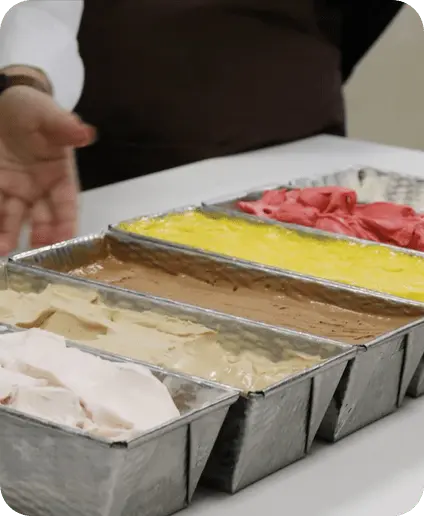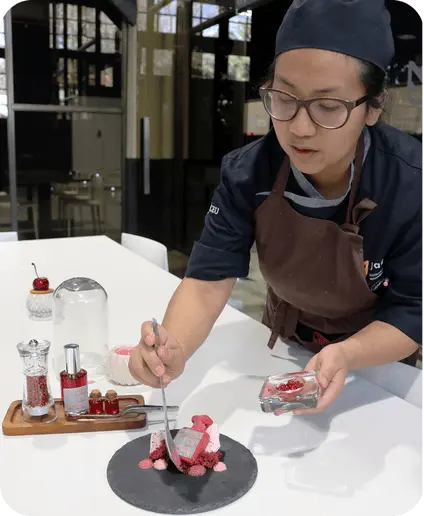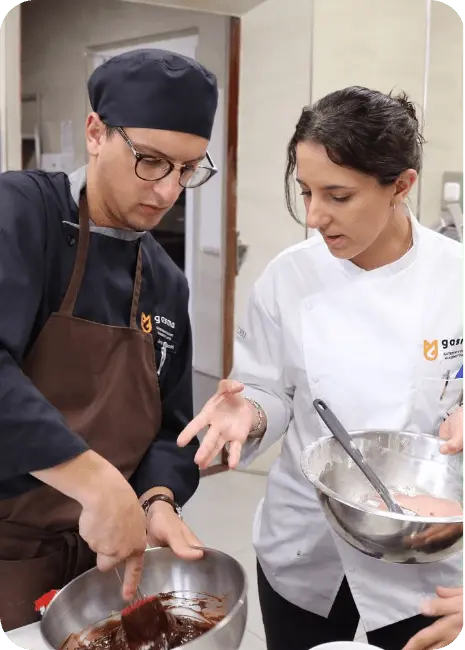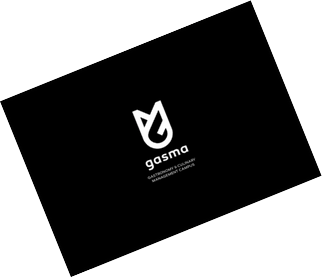
Knowing the physical, chemical and sensory composition of the product is essential to acquire technical skills in gastronomy. Students will learn how food molecules interact and how to apply this understanding to their work methodology in the kitchen.
Module sessions:
Food components
Physicochemical behaviors in food
Macronutrients
Raw materials
In this block, the student will learn the fundamental techniques of classic and traditional pastry making. They will learn how to make different types of sponge cakes, with and without fats, and they will learn about the different types of dry doughs available. You will also learn about the importance of sourdoughs and their health benefits, as well as the elaboration of different sourdoughs, both sweet and savory. We will teach how to recognize the critical points of fermentation and the necessary tips to obtain good results. In addition, an authentic panettone will be made with a three-day fermentation, an Italian recipe that is very present in today's culinary vanguard.
Module sessions:
Whipped dough
Dry dough
Sourdough
Medium and high hydration doughs
Croissant and pastries
Panettone
Puff pastry
In this block, the student will learn how to formulate different preparations, such as mousses, glazes, creams, gelled products, among others. They will not only learn how to interpret a recipe, but will also be able to formulate a recipe from scratch. In the section on crunchies and decorations, the culinary techniques necessary to change the texture of a product by combining different types of sugars available on the market, such as dextrose, maltitol, maltodextrin, isomalt, among others, will be taught.
In terms of technological ingredients, different products such as iota, agar agar, kappa, albumin, kuzu, among others, will be explored. In addition, enzymes will be used to modify the texture of the product without the need for cooking. The use of liquid nitrogen and the elaboration of foams with siphon will also be discussed.
We will learn how to make ice cream using the correct proportions of POD (Sweetening Power) and PAC (Antifreezing Power), in order to formulate a high quality ice cream.
Module sessions:
Crunchy and dehydrated
Pastry decorations
Mousses and glazes
Gelled and creamy
Technological ingredients: nitrogen and the use of the siphon
Formulation in ice cream
Practical ice cream parlor

Your passion and your talent deserve the best system to develop, and that is precisely what we offer you: a learning model that transcends conventional classrooms.
In our diplomas, we embrace the "learning by doing" methodology whereby theory comes to life through your hands and senses, turning each lesson into a unique opportunity to explore, experiment and create.
Imagine an environment where ingredients, pots and pans become tools of expression. In each class, you'll be immersed in the action; from mastering precise cuts to creating signature dishes that stir emotions. Every seasoning, every texture and every presentation will be the palpable result of your effort and dedication.
You will learn as you create, honing your skills in real time. What better way to internalize culinary techniques than by putting them into direct practice?
The "learning by doing" methodology not only accelerates your learning, but also cultivates self-confidence. It's not just about listening and remembering, it's about experimenting and creating.
If you are looking for an eminently practical training that will help you unlock your full gastronomic potential, you are in the right place: join us and start creating your own culinary stories from day one!

Next call: October 2025
Classes: Information will be available soon
Formato: Presencial
Located: Castellón, Spain (see location)
Language: Spanish. Simultaneous translation into English.
Credits: 19 ECTS (Credit system)
Extras included in the registration:
If you already know that you want to study with us, enrolling in our training is very easy.
You must fill in the admission form that you can find in the button 'START ENROLLMENT'.
You will then receive an email confirming receipt of your application and we will contact you via email / call / whatsapp to move on to the next phase of the process: the interview with the Admissions Committee.
Within 24 hours of receiving your application, you will be scheduled for a personal interview* with a member of the Gasma faculty or admissions team.
The purpose of the interview is to get to know the candidates, and to assess their knowledge of the industry and their aptitude for the program.
In this interview, we will let you know if you need to provide any additional documents to complete your application.
* If you are unable to attend in person, the interview can also be conducted via Skype.
After the personal interview, the Admissions Committee will evaluate your application.
Once your application has been evaluated, we will inform you of the result.
If you have been accepted... Congratulations! The admission process has been completed.
In order to secure your place, it is necessary to formalize the payment of the reservation.
Once the place reservation is paid, we will review with you again the necessary documentation for your enrollment. Remember that you must have sent us the following information: ID/Passport, Resume or Letter of motivation and required academic documentation (if necessary).
Gasma is located in Castellón de la Plana (Valencian Community), Spain. The nearest airport is Valencia International Airport (70 km away). Our city is 2 hours by train from Barcelona and just under 3 hours from the capital of Spain, Madrid.
Gasma - Gastronomic Campus
Avenida Enrique Gimeno, 67
12006 Castellón, Spain, EU
Tel: +34 964 217 649
Our international student body continues to grow. We have students of more than 75 nationalities. European students do not need a visa to study in Spain. On the other hand, non-European students must obtain the corresponding visa that includes the authorization to stay in the country.
Students from certain countries are exempt from obtaining a visa as long as their stay in Spain does not exceed three months.
The visa will be requested and issued at the Spanish Consular Offices abroad. Once in Spain, Gasma offers non-EU students the optional International Fee service: with it, they can apply for the foreign student card through the Immigration Office or the corresponding police station within one month of their arrival.
To make your stay easier and more comfortable during your studies, Gasma has agreements with various organizations to provide our students with accommodation options nearby. In advance of your arrival you will be able to choose and reserve your accommodation in an apartment, student residence, etc. Contact our admissions department to clarify any doubts regarding this issue.
No. The Diploma in Sweet World Technique does not include external internships since it is an intensive course with continuous evaluation. The methodology of our programs is practical and participative. This approach is what makes us unique: we move away from purely demonstrative classes and invite students to step forward and participate in them: cooking alongside the best, learning successful models from the experience of the best professionals. You don't just observe, you learn by doing.

